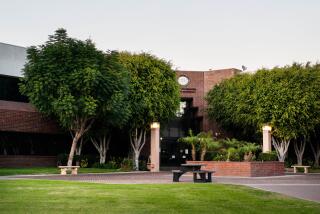Put Hospital’s Survival First
- Share via
Martin Luther King Jr./Drew Medical Center ended 2003 on life support. It’s not dead yet, but without radical surgery it won’t get any better in 2004.
The Los Angeles County health department took over day-to-day management of the county-owned hospital last month after a patient died under questionable circumstances, the third such death since July. A crisis team of the department’s second in command and managers from other county hospitals closed a ward, suspended the nursing director and hired a private firm to run nursing services. Late as it is, this is the kind of drastic shakeup the Watts-area hospital needs if it is to remain open to serve one of the poorest areas in the county. But the hospital is only half the problem.
The private Charles R. Drew University of Medicine and Science, which runs the medical center’s physician-training program under a contract with the county, is also in crisis. Last year, Drew lost accreditation for two of its major residency programs and it faces the loss of a third. Its overall residency program received its second consecutive unfavorable review.
Like the hospital, the medical school has lurched from crisis to crisis for decades. Year after year, its supporters trot out the same solutions: Recruit top-notch administrators and faculty. Find a generous benefactor. Appoint a more experienced board of trustees. But no one is able to answer the riddle of how to attract top talent and dollars to an institution with such a shaky reputation. So the cycle perpetuates itself. Not dead. Not better.
The search for bolder solutions -- bringing in a major university or setting up a single countywide doctor training program -- has been inhibited by King/Drew’s history. The hospital and the medical school were founded after the 1965 Watts riot with the goal of training minority medical professionals to serve a then mostly black community. Sensitive about being viewed as not supporting that goal, county supervisors long resisted fundamental changes.
As the latest crisis intensified, the health department asked former U.S. Surgeon General David Satcher to examine the medical school. The slender report his task force issued just before Christmas contained a few new, if vague, recommendations, such as drastically reducing the training programs Drew offers and forming an alliance with UCLA or USC. It also repeated calls for replacing the current leadership and board of trustees. What the task force didn’t recommend-- but what the county Board of Supervisors must consider -- is pulling the plug on the hospital’s alliance with Drew altogether.
The goal of providing health care to an underserved community remains as laudable today as it was three decades ago, and the population -- although now more Latino than African American -- is just as needy. But the financially strapped county’s first responsibility to that community is to save the hospital, not prop up a failing medical school.






